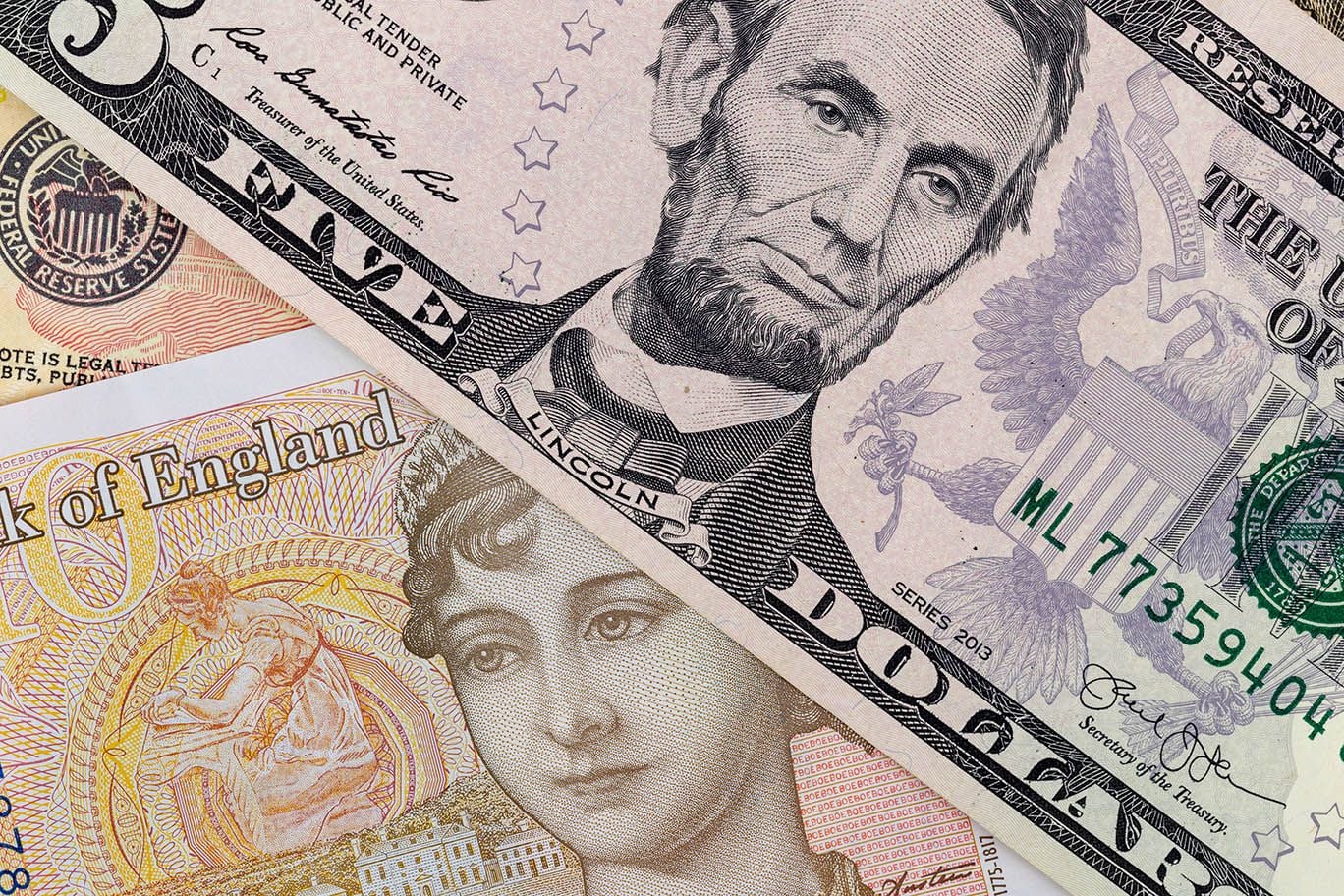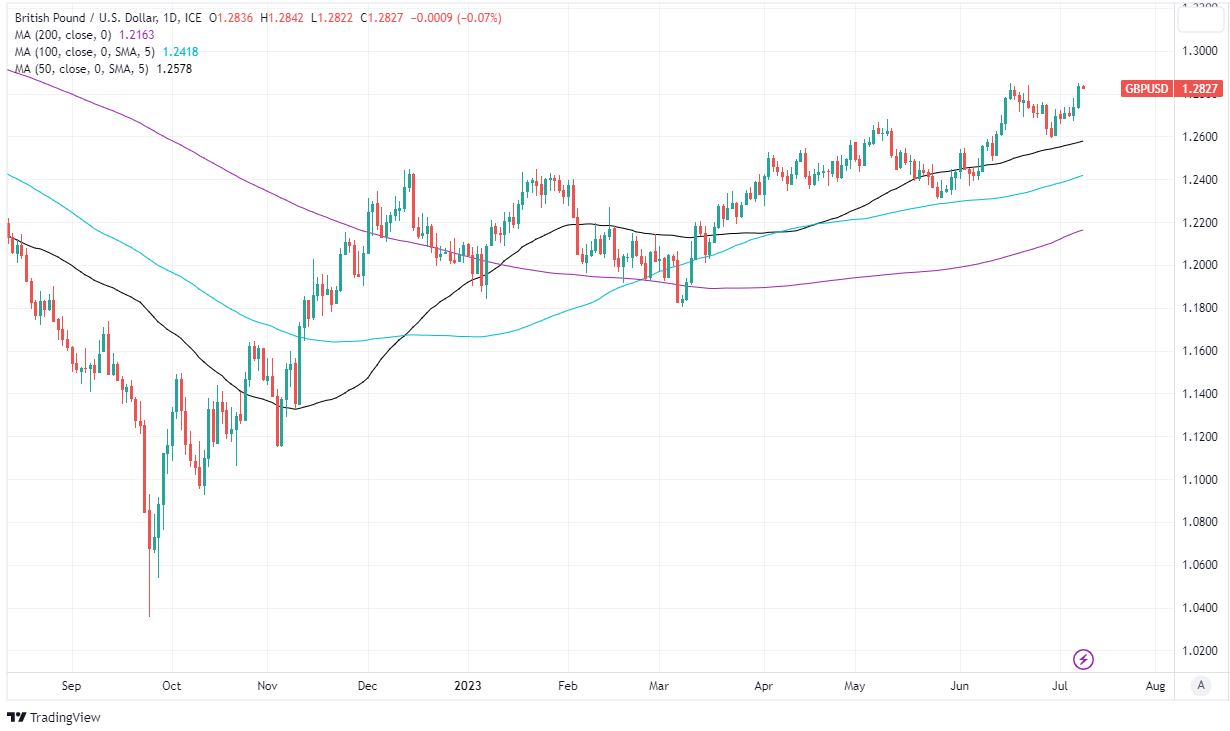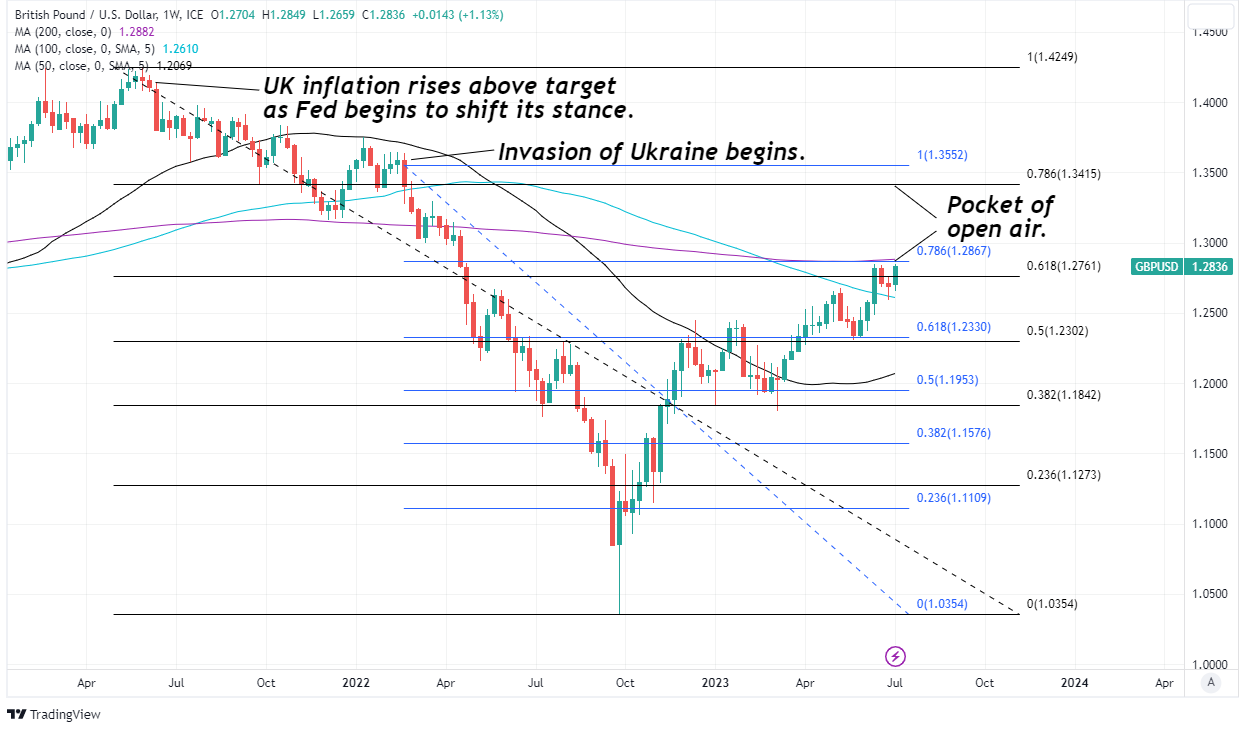GBPUSD Week Ahead Forecast: Recovery Risks Stalling Near 15-month Highs
- Written by: James Skinner
- GBP/USD recovery stalled by resistance near 1.2867 & 1.2882
- Could struggle for momentum if UK's wage growth & GDP soft
- Risking a setback if U.S. inflation rebound lifts Fed rate pricing
- But technical support likely around 1.2610 & 1.2578 short-term

Image © Adobe Images
The Pound to Dollar exchange rate has rallied back to retest 15-month highs in recent trade but the risk is of economic data conspiring with nearby technical resistance on the charts to stall or otherwise sap momentum from its recovery in the days ahead.
Sterling entered the new week trading back above 1.28 against the Dollar after rallying on Friday when the Bureau of Labor Statistics said employment in the world's largest economy had likely grown at its slowest pace since December 2021 in June.
Pound to Dollar gains were also aided by further speculation about how high the Bank of England (BoE) Bank Rate might likely rise, which has helped UK government bond yields remain at a premium to their U.S. counterparts.
But with economic growth in the UK already at a standstill and the expected level of future interest rates now at its highest since early in the new Millennium, the rally may already be in its final throes, while Tuesday's UK employment data and Wednesday's U.S. inflation number could easily lead to a setback for Sterling in the days ahead.
"Market pricing implied a peak for Bank Rate of 6.5%, up 25bps on last week, while bond yields for maturities ranging from two years to 10 years are now back above the levels seen in the aftermath of last September's mini-Budget," says Andrew Goodwin, chief UK economist at Oxford Economics.
Above: Pound to Dollar rate shown at daily intervals with selected moving averages.
"The MPC will be under pressure to keep hiking until it sees clear evidence that wage growth is beginning to cool. If the MPC doesn't push back against these pressures forcefully enough, the risk they persist will increase," Goodwin adds.
The wage growth component of Tuesday's UK employment report will be of most interest to the Pound after rising to a new record of 7.2% last time around with the help of a near 10% increase in the minimum wage for April, which acted as the initial catalyst for the recent and ongoing rally in expectations for Bank Rate.
Economist surveys suggest an expectation for average pay to rise 7.1% on Tuesday but with market pricing of the outlook for Bank Rate already having risen a long way, the Pound might be more sensitive to a weaker-than-expected number than any upside surprise.
GBP to USD Transfer Savings Calculator
How much are you sending from pounds to dollars?
Your potential USD savings on this GBP transfer:
$1,702
By using specialist providers vs high street banks
"Wage growth, along with CPI on 19 July, will be an important indicator of whether the Bank hikes 25bp or 50bp in August," says Abbas Khan, an economist at Barclays.
Tuesday's data is followed by the BoE's latest financial stability report and press conference on Wednesday and an Office for National Statistics estimate of economic growth for May on Thursday when economists will be looking to see GDP fall by -0.3%.
Thursday's GDP figure would more than reverse the 0.2% increase seen in April while placing the economy on course for a second-quarter contraction if the consensus is correct though whether this would be enough to dampen market expectations for interest rates remains to be seen.
Above: Pound to Dollar rate shown at weekly intervals with Fibonacci retracements of highlighted downtrends indicating possible areas of technical resistance for Sterling while selected moving averages denote possible support and resistance levels.
"Positioning and the GBP’s short-term yield premium versus the USD is supporting the rebound," says Shaun Osborne, chief FX strategist at Scotiabank.
"Trend momentum remains solidly bullish across short-, medium-, and long-term oscillators, suggesting a push to (and through) the mid-1.28s is still on the cards. Look for firm support on dips to the low 1.27s intraday," he adds in a Friday research briefing.
The Pound will also be sensitive to the June inflation figures out in the U.S. on Wednesday and whether they lead the markets to more confidently anticipated further increases in the Federal Reserve interest rate later this year, which the bank recently suggested could rise as far as 5.75% by year-end.
"The Cleveland Fed’s inflation ‘nowcast’ suggests core and headline CPI remained too high at 0.4%/mth (Wednesday). A mix of 0.1%/mth and 0.2%/mth readings are needed to be consistent with 2%/yr inflation," says Joseph Capurso, head of international economics at Commonwealth Bank of Australia.
"GBP/USD can head lower in coming weeks towards support at 1.2572 (50 day moving average). We expect the UK labour market data to be soft," he adds in a Monday note.






